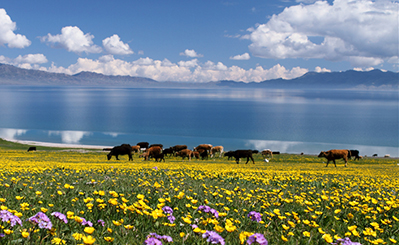Short videos depict peaceful and happy lives in south Xinjiang
A group of people from the southern part of China’s Xinjiang Uygur autonomous region, who have been confirmed as graduates from vocational education and training centers in the region, have aroused great interest in the international community. They were filmed in a series of short videos recently released on social media platforms in which they speak about their peaceful and happy lives with promising future.
Gheni Amat is a chef who runs a restaurant in Aksu, a city in south Xinjiang. He had traveled to a couple of cities across China with his mentor and learned culinary skills of different cuisines. He attended a cooking competition in Beijing in August 2017 and won second prize. Later he was elected executive president of a cuisine association in Aksu. Besides traditional Xinjiang cuisine, Amat’s restaurant provides Western food and the major cuisines of China. In his eyes, Aksu is a diversified city, where different cultures and customs coexist.
In fact, this man, with such a prosperous business, stayed in Aksu’s vocational education and training center from May 2018 to November 2019, according to Meng Chao, a founding partner of the Internet company Damei Xinjiang.
"We met Amat when a local friend guided us to his restaurant for dinner. We were a little surprised after knowing his experience because his Mandarin is good and he looks enthusiastic and positive,” said Meng. “He is a man enjoying his life, just like anyone around us,” he noted.
The centers in Kashgar, Hotan and Aksu helped trainees learn the common national language, legal knowledge, and vocational skills. The education sessions aimed to keep the trainees from experiencing terrorist and extremist thoughts so that they can improve their employment skills and better integrate into society.
Meng said he has met a few trainees who have graduated from the centers and found that they had dreams and goals with love and confidence in life.
Meng’s company, Damei Xinjiang -- literally Fantastic Xinjiang -- is mainly engaged in promoting Xinjiang's beautiful scenery and attracting tourists. After meeting these people, Meng came across a new idea.
"I wondered if I could make a series of short videos to truly reflect the work and life of these trainees after graduation, and show the economic and social changes and development of south Xinjiang through them," Meng said.
Multiple violent terrorist activities took place in south Xinjiang between 1990 and the end of 2016, killing many innocent people. Since then, the region has learned from international experiences and took strict measures according to the law to harshly crack down on violent terrorist activities. As a result, Xinjiang has maintained social stability and an excellent economic development trend with no terrorist attacks since 2017.
Meng said he then discussed with his friends in Kashgar, Hotan and Aksu, and decided to produce the short videos about six months ago.
Although the COVID-19 epidemic brought a lot of difficulties to the shooting, the production teams got support from the trainees and were able to proceed smoothly. Meng said they filmed a total of 100 such trainees who are working in a variety of industries, including as wedding photographers, couriers, community workers, pastry chefs and teacher s at training institutions. All of them are living freely in their own cities, taking care of their families and pursuing their dreams.
These graduates said through their study in the teaching and training centers they had improved their Mandarin, mastered tworking skills, and had more confidence in their future lives, according to Meng.
Their videos were applauded by viewers after they were broadcast. "I want to taste your cuisine if I have any chance to go to Aksu city," Twitter user MacArthur wrote in a comment addressing Amat’s video.
"This is the real Xinjiang. People live and work here in peace and contentment. I hope everyone can come to Xinjiang," wrote Twitter user HauYoucef.
Meng said he plans to take more photos and videos showing the real life and work of people in Xinjiang so as to make the region more widely understood.
 Attractions
Attractions Dining
Dining Culture
Culture